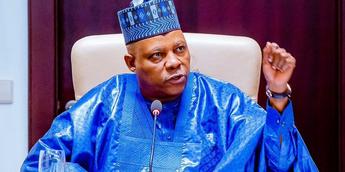Vice-President Kashim Shettima has expressed the determination of the country to become number one hub of opportunities in the global halal economy.
Shettima stated this on Wednesday during the Halal Economy Stakeholders Engagement Programme held at the Banquet Hall of the Presidential Villa, Abuja.
He said the nation’s economic and demographic size puts it in a vintage position to map out a vibrant investment sector for the global halal economy projected to reach a market value of $7.7 trillion by 2025.
The Vice-President noted, however, that Nigeria must first reassess its weaknesses and prioritise its strength to achieve this economic feat.
” For Nigeria to become a hub of opportunities in the global halal economy, we must prioritise our strengths and reassess our weaknesses.
” Today’s engagement provides a platform for us to collaborate with key international organisations.
“This will allow us to develop a comprehensive halal ecosystem and agree on strategies that will position Nigeria as a top halal exporter, targeting high-value markets.”
Shettima commended the private sector for its immense contributions to driving the halal economy, particularly in the financial sector.
He encouraged all stakeholders to partner with President Bola Tinubu’s administration in delivering the halal ecosystem.
” To ensure this, we must attract international investment by showcasing the vast opportunities within Nigeria’s halal sector through investor summits, roadshows, and business matchmaking events.
” The expansion of regional trade, particularly through the African Continental Free Trade Area (AfCFTA), also provides us with a pathway to become a leading supplier of halal goods and services across Africa.
” Therefore, we must increase public awareness through strategic orientation campaigns, specialised training programmes.
” We must also deepen engagement with the global market to elevate the visibility and competitiveness of Nigeria’s halal ecosystem,” he said.
Shettima described halal as an economy that accommodates all actors and stakeholders.
He noted that the halal market holds vast potential that aligns “with the overarching agenda of His Excellency, President Bola Ahmed Tinubu”.
He said that lack of clarity and understanding surrounding compliance with investments in the halal economy had stifled vast potential in savings, business ventures, and investments.
Shettima expressed delight that in an era of knowledge and enlightenment, more Nigerians are now getting rid of outdated concerns and are, instead, embracing the need to have a say in how their money is invested.
Earlier, Sen. Ibrahim Hadejia, the Deputy Chief of Staff to the President (Office of the Vice President), had emphasised the importance of the initiative.
” Nigeria, as one of the largest economies in Africa, is launching this programme to engage with the global Halal market.
” We are determined to position Nigeria as a leader in the Halal economy, not just in Africa but globally, ” Hadejia said.
Also, Special Assistant to the President on Export Expansion, Aliyu Sheriff, highlighted halal economic potential.
” If we can increase our Halal exports to the Organization of Islamic Cooperation (OIC) countries from two to six per cent over the next four years, it could boost our Gross Domestic Product (GDP) by 548 million dollars.
Sheriff said some of the key objectives of the initiative include establishing a robust regulatory framework for Halal certification and increasing consumer awareness about Halal products.
The Minister of Agriculture and Food Security, Sen. Abubakar Kyari, said Nigeria’s domestic spending on Halal products and services reached approximately 107 billion dollars in 2022.
“This sector is projected to grow at a rate of 10.7 per cent , reaching 180 billion dollars by 2027.
” This positions Nigeria as the 8th largest domestic Halal economy globally and the second largest in Africa,” he added.
The Minister of Finance and Coordinating Minister of the Economy, Wale Edun, stated halal products are not just for Muslims.
” There are over 125 products that are produced in the Halal way. This presents a huge opportunity for rapid growth and improved competitiveness, enhancing our ability to export,” he said. (NAN)
























